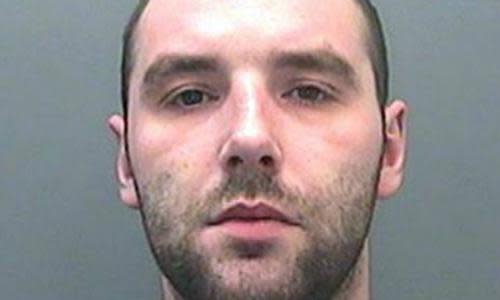‘Doomed to failure’: parents blame probation changes for son's death
Every night at bedtime, 18-year-old Conner Marshall would text the same message to his mother. It said in Welsh: “Good night. I love you.”
“He was a kind, well-mannered boy, a gentle soul,” said Nadine Marshall. “He always sent that note whether he was in his bedroom next to us or at a friend’s house. But that Saturday the message didn’t come through. I thought maybe he was having a late night out.”
Conner had been enjoying a break with friends at a holiday park in Porthcawl, south Wales, and had been due back on Sunday lunchtime to celebrate his mum’s birthday at the family home in Barry. He did not make it.
Instead, police knocked on the Marshalls’ door to inform them that Conner was in hospital. He had been the victim of a random and unprovoked attack by 25-year-old David Braddon, a serial violent offender. Conner’s injuries were too severe to survive.
“It all unravelled there and then,” said Nadine. “We have been dragged through the depths of despair and every aspect of our lives has changed.”
As Nadine, a teacher, and Conner’s father, Richard, a lorry driver, began to investigate the murder, they were shocked to discover that at the time of the attack Braddon was being supervised in the community after an attack on a police officer and drugs offences.
The family fought for the right to see the probation records and campaigned for a full inquest, believing that something had gone badly wrong in the way Braddon was overseen.
During the two-week hearing at Pontypridd, the probation services officer who was supervising Braddon, Kathryn Oakley, described being “overwhelmed” by her workload. She testified that the body in charge of Braddon’s care, the Wales Community Rehabilitation Company (CRC), was chaotic and short-staffed in the months before the murder in March 2015.
Though Oakley was inexperienced, she said she was juggling 60 cases including Braddon’s and did not have time to do as thorough a job as she would have liked. Oversight of her work by managers was often ad hoc, she claimed.
It emerged that Braddon had missed a series of appointments and admitted he was drinking and had come off medication for mental health issues. At the time of the attack on Conner, he was high on drugs and alcohol.
The Marshalls do not blame Oakley. “She was completely out of her depth,” said Nadine. “She was too inexperienced to deal with someone like Braddon, who was manipulative and bullying and knew how to play the system. She is a victim too.”
They argue that the system was to blame. The Wales CRC was set up as part of the 2013 Transforming Rehabilitation programme, championed by the then justice secretary Chris Grayling. Thirty-five probation trusts in England and Wales were dismantled and replaced with CRCs, managed by private companies, to manage low- or medium-risk offenders, while the National Probation Service looked after those posing a higher risk.

Despite his history, Braddon was not seen as a high risk and in a witness statement read to the inquest Oakley said staff were encouraged by managers not to take action against those they were supervising unless absolutely necessary because the CRC could lose money if this happened.
Nadine said the Transforming Rehabilitation programme was a disaster. “It was doomed to failure,” she said. “It may have looked good on paper but it couldn’t work in the real world. The politicians were warned by probation staff and the unions but they didn’t take any notice. It was a chaotic system.”
Conner’s family feel that offenders such as Braddon were given too much leeway. Richard Marshall said that as a lorry driver he was given random drink and drug tests. “But they just asked Braddon if he had been drinking or taking drugs and they believed him,” he said.
Nadine said staff seemed to be over-tolerant. “There’s a belief that every offender can be rehabilitated. They are very trusting. Whether it was because of their caseload or lack of experience, they were relying too much on the offender to cooperate, and they are often well-rehearsed career offenders.”
The Marshalls are angry that during the inquest managers played down Oakley’s claims about the pressure she was under. Nadine said: “It’s frustrating that management are making out it was a wonderful place to work. They must have been aware of the chaos. We think they’re maintaining a facade that everything was OK.”
The system is being changed again but Conner’s family are not convinced lessons have been learned. “For five years we’ve had to battle, battle,” said Nadine. “We’ve had to sit there in court as probation have given themselves glowing reports. We want to stand up and say ‘you’re lying, you’re lying,’ but we can’t. We’d be carted out of court.”
Richard described Braddon, who was jailed for a minimum of 20 years for the murder, as a “ticking timebomb”. He said: “I hope he never gets released. He went out to cause harm to someone. If it wasn’t Conner it would have been someone else.”
Conner had done well at school, gone to college and had been about to begin a job at a supermarket, having borrowed his dad’s shoes for the interview. When he was 16 he got a tattoo saying “Life goes on”. He made it clear he wanted his organs to be donated if he died, and after his death his organs gave three other people a chance to live.
Nadine said she was proud her son had been able to help others. “But I’ll never get closure, I won’t ever move on,” she said.

 Yahoo News
Yahoo News 